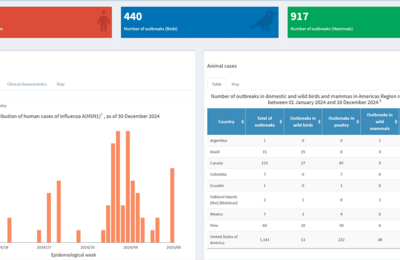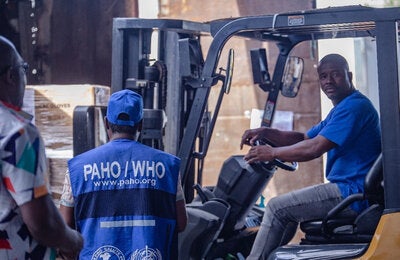
Bridgetown, Barbados, 9 June 2023 (PAHO/WHO) – Six more Caribbean professionals have commenced a year-long journey in the University of the West Indies (UWI) Climate Change and Health Leaders Fellowship Training Program.
They are: Gerty Pierre, Climate Change Director, Ministry of Environment, Haiti; Dr. Clint Todd Lewis, Senior Environmental Health Officer, Ministry of Health, Wellness and the Environment, St. Vincent and the Grenadines; Dr. Nneka Hull James, Veterinary Officer, Ministry of Agriculture, Antigua and Barbuda; Dr. Nyoni Winchester, Instructor, St. George's University, Grenada; Jessica John, Vice President, Trinidad and Tobago Association of Nutritionists and Dietitians, Trinidad and Tobago; and Roshnie Jhanjan, Policy Advisor, CARICOM and PAHO affairs and CARICOM Focal Point, Ministry of Health, Suriname.
Their orientation took place on June 1, and followed a summative workshop for cohort two, in Kingston, Jamaica.
The goal of the Fellowship Program, funded by the European Union (EU), is to develop strong, effective Climate Change leaders implementing the One Health Approach. This approach recognises the shared challenges across the region and the intricate interconnections between the health of people, animals, plants, and their shared environment.
During the address to the new cohort, Dean Chambliss, Subregional Programme Director of the Pan American Health Organization's Caribbean Subregional Program Coordination Office, highlighted the significance of the Fellowship within the EU/CARIFORUM Climate Change and Health project. The primary objective of this Project is to strengthen climate-resilient health systems in the Caribbean region, and the Fellowship plays a crucial role in achieving this goal.
“Systems, however, are conditional on having well placed, trained, motivated people who are working collaboratively to empower action… The inter-sectorial and multidisciplinary approach of the Climate Change and Health Leaders fellowship training program is designed to create leaders with skills and expertise to address the complex challenges related to climate change and its impacts on health. This threat requires that we plan more strategically, strive to influence policy development and support community action and advocacy,” Mr Chambliss stated.
He underlined the need for research and monitoring to better understand the specific health impacts of climate change in the Caribbean context, enhanced early warning systems to alert communities and healthcare providers about impending climate-related health hazards and increased awareness of adaptive strategies and behavioral changes to reduce vulnerability at the individual, institutional and societal levels.
The prioritization of climate change adaptation and resilience planning in the health sector and interdisciplinary collaboration and active participation in regional and international dialogue on climate change and health were also highlighted.
Co-Coordinator of the program, Professor Christopher Oura expressed that in addition to attending themed online sessions throughout the year, the Fellows are exposed to a “learning-by-doing approach”. They are expected to implement a national project, a symposium and spend a week at a CARICOM Climate Change and Health Agency. “Our fellows are solving real problems and as you finish the fellowship your involvement will be critical going forward,” Prof. Oura said.
The Fellowship is one aspect of the EU/CARIFORUM Climate Change and Health Project, which runs until 2025.



